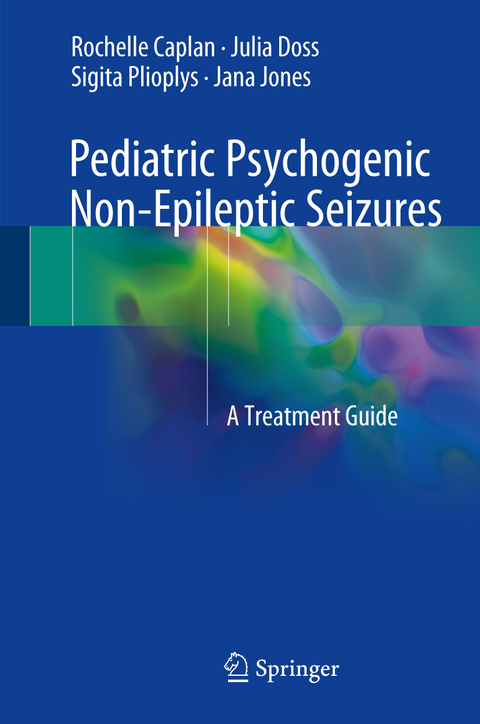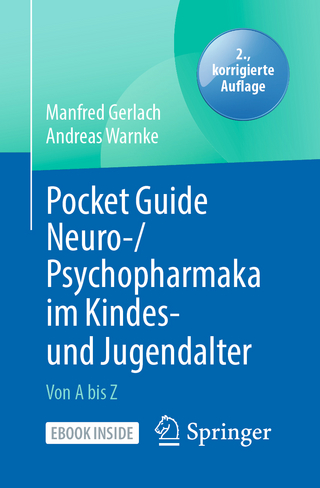
Pediatric Psychogenic Non-Epileptic Seizures
Springer International Publishing (Verlag)
978-3-319-55121-0 (ISBN)
The text begins by introducing the main features of the disorder and the problems involved in diagnosing PNES in children. It then describes techniques to overcome these problems in order to make a reliable and valid diagnosis of PNES, as well as provide feedback on the diagnosis and treatment plan. The last section describes the indications for cognitive behavior therapy for youth with PNES and suggested treatment paradigms. Incorporation of do's and don'ts and their relevant clinical examples in all sections of the proposed guide provide the reader with skills and techniques. The book also includes an appendix with resources for parents, children, and school nurses and teachers, relaxation techniques for the child and parents, templates of letters for the child's school about the condition and behavior management plan, templates of supporting letters from epileptologists and primary care physicians, CBT treatment paradigm, and information on individual supervision, workshops and webinars.
Written by the few experts in this area, Pediatric Psychogenic Non-Epileptic Seizures is the ultimate guide for psychiatrists, psychologists, nurses, primary care physicians, neurologists, epileptologists, social workers, nurses, school counselors, and all medical professionals working with children experiencing seizures.
Rochelle Caplan, M.D.Professor Emeritus Department of Psychiatry UCLA, rcaplan@ucla.edu Julia Doss, Psy.D.Pediatric PsychologistMinnesota Epilepsy Groupjdoss@mnepilepsy.net Sigita Plioplys, M.D.Professor, Department of PsychiatryNorthwestern UniversitySplioply@luriechildrens.org Jana Elizabeth Jones, Ph.D.Associate ProfessorDepartment of NeurologyUniversity of Wisconsin School of Medicine & Public Health jejones@neurology.wisc.edu
Introduction and Overview.- Overview.- The underlying psychopathology, triggers, and risk factors.- Gold standard diagnosis.- Why is it difficult to diagnose pediatric PNES?.- Red flags during the clinical exam.- Techniques for the child diagnostic interview.- Strategies to use in the Initial parent interview.- Introduction: The importance of the feedback.- How to present feedback and treatment plan to the parents.- Approaches to use in the child feedback and description of the treatment plan.- Combined parent and child feedback and treatment plan.- Psychoeducation about PNES: Child, parents, treatment team, teachers.- How to develop rapport with the child and parents.- Strategies for NES symptom resolution through individual child therapy and work with the parents.- Child reintegration to school and regular life routines.- Treatment of comorbid psychopathology.- Long-term Therapy.- Introduction.- Goals for child therapy.- Goals for work with the parents.- Indications.- Application of CBT in anxiety and depression.- Essential CBT elements that enhance child goals.- Application of CBT to enhance parent goals.- Appendix.
"The authors' main goal is to instruct mental health providers how to recognize PNES in pediatric patients, and more importantly develop a multidisciplinary and comprehensive treatment plan involving both the patient and parents targeted at the cessation of the episodes. ... The authors deliberately target mental health professionals, including both prescribers and nonprescribers, although the obvious emphasis is on professionals who are skilled in psychotherapy." (Matthew J. Koscica, Doody's Book Reviews, January, 2018)
“The authors’ main goal is to instruct mental health providers how to recognize PNES in pediatric patients, and more importantly develop a multidisciplinary and comprehensive treatment plan involving both the patient and parents targeted at the cessation of the episodes. … The authors deliberately target mental health professionals, including both prescribers and nonprescribers, although the obvious emphasis is on professionals who are skilled in psychotherapy.” (Matthew J. Koscica, Doody's Book Reviews, January, 2018)
| Erscheinungsdatum | 04.06.2017 |
|---|---|
| Zusatzinfo | XV, 204 p. 441 illus., 440 illus. in color. |
| Verlagsort | Cham |
| Sprache | englisch |
| Maße | 155 x 235 mm |
| Gewicht | 503 g |
| Themenwelt | Medizin / Pharmazie ► Medizinische Fachgebiete ► Psychiatrie / Psychotherapie |
| Schlagworte | Cognitive behavioral therapy (CBT) • Diagnostics • Long- and short-term treatment • Psychoeducation • School reintegration |
| ISBN-10 | 3-319-55121-3 / 3319551213 |
| ISBN-13 | 978-3-319-55121-0 / 9783319551210 |
| Zustand | Neuware |
| Haben Sie eine Frage zum Produkt? |
aus dem Bereich


